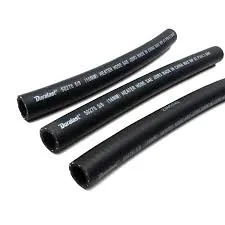Durable Hydraulic Hose Solutions for Diesel Fuel Transport and Delivery Systems
Nov . 09, 2024 07:39 Back to list
Durable Hydraulic Hose Solutions for Diesel Fuel Transport and Delivery Systems
The Importance of Hydraulic Hoses for Diesel Fuel Lines
In the world of heavy machinery and transportation, diesel fuel lines play a critical role in ensuring the efficient and reliable operation of engines. At the heart of these fuel delivery systems are hydraulic hoses specifically designed to handle the demands of diesel fuel. Understanding their significance, characteristics, and maintenance can greatly enhance the performance of diesel engines and minimize the risk of failures.
What are Hydraulic Hoses?
Hydraulic hoses are flexible tubes capable of withstanding high pressure while transporting fluids, including diesel fuel. They are made from a variety of materials, often incorporating a rubber or thermoplastic outer layer to provide durability and resistance to abrasions, environmental factors, and chemical exposure. Inside, hydraulic hoses typically feature one or more layers of reinforcement made from steel wire or synthetic fibers, which allows them to endure the considerable pressures generated within fuel lines.
Applications in Diesel Fuel Lines
Hydraulic hoses are extensively used in diesel fuel lines across various applications. In industrial settings, they connect fuel tanks to engines in construction equipment like excavators and bulldozers. Similarly, in the transportation sector, these hoses are crucial for linking fuel storage systems to diesel-powered vehicles, including trucks, buses, and ships. Their ability to handle high pressure without leaking is vital for maintaining efficiency and safety in operations.
Key Characteristics
1. Temperature Resistance Diesel fuel lines often need to operate under varying temperature conditions. Hydraulic hoses designed for these applications are built to withstand extreme temperatures, ensuring that they do not crack or degrade over time.
2. Chemical Compatibility Diesel fuel is a complex blend of hydrocarbons and can contain various additives. A suitable hydraulic hose must be chemically resistant to prevent deterioration and ensuring a long service life.
3. Flexibility and Bend Radius Diesel fuel lines often require complex routing in machines and vehicles. Hydraulic hoses provide the necessary flexibility, allowing for tight bends and easy installation without compromising the integrity of the hose.
hydraulic hose for diesel fuel line

4. Pressure Ratings Diesel engines can generate high levels of pressure in fuel lines. Hydraulic hoses are rated for specific pressure levels, ensuring they operate safely and effectively without risk of bursting.
Maintenance Tips
To maximize the lifespan of hydraulic hoses in diesel fuel lines, regular maintenance is crucial. Here are a few tips
1. Routine Inspections Regularly inspect hoses for signs of wear, leaks, or abrasion. Early detection can help prevent major failures.
2. Proper Installation Ensure hoses are installed correctly, following manufacturer guidelines. Using the right fittings and avoiding sharp bends can significantly reduce the risk of damage.
3. Temperature Monitoring Keep track of the operating temperatures. If hoses regularly exceed recommended limits, consider upgrading to higher-rated hoses.
4. Replace When Needed If a hose exhibits significant wear or damage, replace it immediately to prevent potential leaks or failures that can compromise engine performance.
Conclusion
Hydraulic hoses for diesel fuel lines are indispensable components in many industrial and transportation applications. Their ability to withstand high pressures, extreme temperatures, and a variety of chemical exposures makes them suitable for demanding environments. By understanding their importance, characteristics, and maintenance requirements, operators can ensure the efficient and safe functioning of diesel engines, ultimately enhancing productivity and reliability. Regular inspections and timely replacements of hydraulic hoses will contribute to extending their lifespan and maintaining the overall health of fuel delivery systems.
